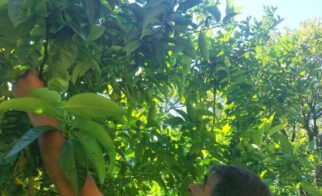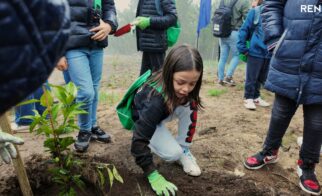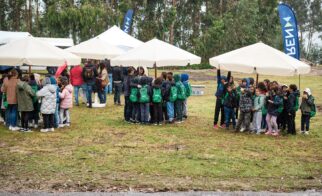REN’s project preserves the endangered and culturally important Ermelo orange trees within powerline Right-of-Way corridors, converting them into productive agricultural spaces. This approach mitigates environmental impacts, enhances biodiversity, and strengthens relationships with local communities while promoting sustainable landscape management.
Highlights
01
Successfully increased the overall population of Ermelo orange trees from 500 to over 1,800, contributing to the preservation of a unique local variety.
02
Collaborated with local stakeholders, including schools and beekeepers, for long-term involvement and educational initiatives.
03
Developed 3 hectares of orange groves under powerlines, showcasing a sustainable use of the transmission corridors while reducing vegetation management costs.
Main Information
Since 2010, REN has been implementing a Right-of-Way (ROW) reconversion programme to transform transmission corridors from fast growing and invasive species into sustainable and productive agricultural or forest spaces of slow growing species compatible with the grid. The initiative has the objectives of reducing management costs, promoting ecosystem services, improving infrastructure protection, and fostering positive community relationships. With the objective of further improving this strategy, REN collaborated with local communities to preserve the historically significant Ermelo orange trees, a unique variety dating back to the 13th century, currently with a very limited producing population of around 500 trees. In recent years, there has been a sharp decline in Ermelo orange production due to population aging and depopulation, as well as the lack of a modernisation strategy that takes into account the traditional practices.
Due to the lack of reproductive material, local stakeholders identified the best trees for propagation in nursery. Soil preparation included stump removal, soil pH correction, and manure spreading, followed by the sowing of biodiverse pastures to promote carbon and nitrogen fixation and support pollinators. Local authorities also contributed by installing an irrigation system, showing the shared commitment to this area. In the future this area will benefit local beekeepers, for the production of orange blossom honey, and local cattle producers, with the objective of using functional herbivory for vegetation management.
The project culminated in a launch event in May 2024, where the last trees were symbolically planted by local schoolchildren, demonstrating a shared commitment to preserving the region’s natural and cultural heritage. This innovative use of transmission corridors not only protects a local variety of oranges but also serves as a platform for economic development, with plans including honey production and potential commercialisation of orange-derived products. The initiative aligns with REN’s sustainability strategy, transforming the impact of powerlines into a community-centric opportunity that fosters long-term environmental stewardship.
other practices







